October 10, (THEWILL) – Akwa Ibom State was created on September 23, 1987 from Cross River state. Its capital and major city is Uyo. The state is in coastal southern Nigeria. It is bordered on the east by Cross River, on the west by Rivers and Abia states, and on the south by the Atlantic Ocean and the southernmost tip of Cross River state. There are extensive saltwater mangrove swamps along the coast with tropical rain forests and oil palms farther inland. Akwa Ibom is currently the highest oil- and gas-producing state in the country.

The people’s major occupations are farming and fishing. There are also forestry-related activities, such as wood-cutting and processing.
FACT FILE:
Local government areas: 31
Land Area: 2,734sq mi.
Population: 5.27 million @ 2019
Registered businesses: 1,060
Public primary schools: 1,150 circa
Public secondary schools: 260 circa
Universities: (4): Federal – 1, state – 1, private 2
Polytechnics: (9): Federal 1, state – 2, private- 6
College of Education : State – 1
Colleges of Agriculture: (2: Federal – 1, state -1.
Nursing School: (5): Mid-wife and nursing – 4, mental health – 1
College of Health Technology: State – 1
Technical Schools: (5)
Total Revenue: N176.92bn
Total tax: N26.75bn
IGR: N30.69bn @ 2020 (17.35% of total revenue)
FAAC: N146.26bn @ 2020 (82.45% of total revenue)
Domestic Debt: N230.80bn @ 2020
External Debt: $47.92m @ 2020
Unemployment rate: 45.2% @ 2010
Airport: Victor Attah International Airport, Uyo.
Akwa Ibom has its own airline – Ibom Air with eight aircraft.
Sea Port: Ibono
Natural resources
Crude oil, lime stone, clay, natural gas, salt, coal, giver nitrate and glass sand.
Tourist attraction in Akwa Ibom
Ibeno Beach
Bridge of no return
Lord Lugard’s Place at Ikot Abasi
National Museum of Colonia History
Eket Beach
Ibibio Museum and park
Amalgamation House
First Presbyterian Church at Oron
Oron Museum
Agriculture
Rural economy of the state is largely agro-based, which is responsible for about 75 percent of the population’s occupation. Factors that favour agriculture in Akwa Ibom include favourable year-round climate, abundance of rich fertile soil and coastal topography.
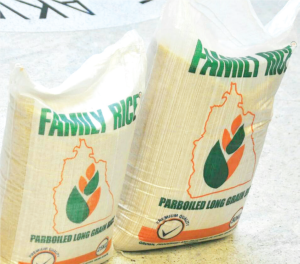
The state’s major agricultural produce are yams, rice, cowpeas, corn (maize), and cassava for subsistence living, while oil palms and cocoa are largely cash crops. Livestock activities in poultry, rearing of pigs, sheep, goats and rabbits are part of the people’s occupation. There is also shrimping along the coast and deep-sea fishing.
ALSCON
The Aluminium Smelter Company of Nigeria, (ALSCON) located in Ikot Abasi, was established in 1989. The philosophy of the Aluminium Smelter project is the exportation of the nation’s abundant gas resources in embodied form to generate the much needed foreign exchange for the country. The smelter will utilise a substantial portion of gas: approximately a billion cubic metres annually, which is currently wastefully flared in the oil production industry, to generate economic energy for the production of aluminium, the bulk of which will be exported.
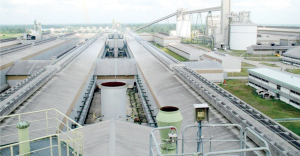
The availability of relatively cheap energy, which constitutes a significant 30 per cent of the cost of the energy-intensive process of aluminium production, is expected to enhance the competitiveness of the aluminium smelter plant products on the international market
Another important objective of the aluminium smelter project is the supply of the basic raw materials (ingots and billets) to local aluminium rolling mills and extrusion plants. These raw materials are currently imported.
Regrettably, the facility has been embroiled in a controversial post-privatisation legal tussle that has lasted for over 15 years. Although the Governor, Udom Emmanuel, has declared the state’s readiness to partner with the Federal Government to ensure that the aluminium factory comes back to life, this has remained far from being realised.
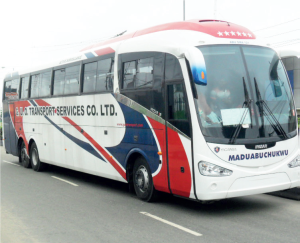
Akwa Ibom Launches Into Rapid Agriculture, Industrialisation
Akwa Ibom has embarked on rapid industrialisation beyond the traditional pursuit of agricultural development. To achieve this, it has established several skill acquisition centres and has upgraded a number of existing ones to technical colleges.
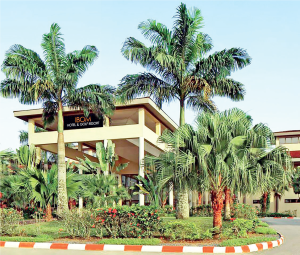
Following the license it secured for the generation of 685 megawatt at Ibom Power Plant, Ikot Abasi, the state began the construction of a Power Sub-Station and the rehabilitation of PHED facility at in various locations. It also embarked on the construction of 1x60MVA, 132/33KV transmission sub-station.
In 2017, the Udom Emmanuel’s administration established the Jubilee Syringe Manufacturing Company, located in Onna local government area. It is the largest disposable syringe factory in Africa, with the capacity to produce 350 million to 400 million units of 2ml, 5ml, and 10ml disposable syringes annually. The factory began mass production of face masks in April 2020, in response to the measures aimed at curbing the spread of COVID-19 in Nigeria.
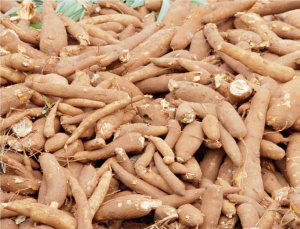
The Akwa Ibom state recently embarked on an agricultural project an integrated cassava production program under a project known as the Dakkada Cassava Task Force. About 2,000 hectares of cassava were reported to be cultivated under the FADAMA project. Special species of cassava in popular demand were cultivated to meet international demand purposes and to earn foreign exchange.
Over the years, the state had challenges cultivating agricultural plants and crops such as cucumber, carrot, onions, tomatoes, cabbage, lettuce in commercial quantity. The state established the Vegetable Greenhouse technology to seek a solution and has since recorded success. In a bid to further enhance food sufficiency and earning, the state government distributed over 2,000 African Dwarf goats to livestock farmers.
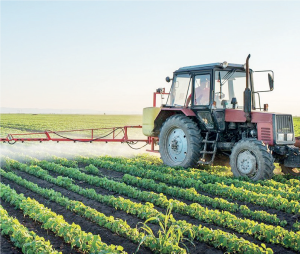
Akwa Ibom state government is giving priority to all four broad sub-sectors of agriculture as crop production, livestock, forestry and fisheries believed to be fundamental to every country’s prosperity, security and sovereignty. As such farmers, processors, researchers and policy-makers at all levels are working together under the economic recovery plan of government to promote and ensure a vibrant agricultural economy.
The success story achieved in the sector, according to Governor Udom Emmanuel, is anchored on the premise that the agricultural transformation has to be across the entire value chain – from field to mill to the table and another set to the factory for export so as to earn foreign exchange.
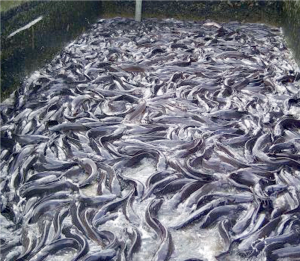
Challenging situations to address: Insecurity, policy inconsistency of government, multiple taxes, extortion, poor power supply and terribly bad road network.
*** BY SAM DIALA & OLAYEMI SHABA
About the Author
Sam Diala is a Bloomberg Certified Financial Journalist with over a decade of experience in reporting Business and Economy. He is Business Editor at THEWILL Newspaper, and believes that work, not wishes, creates wealth.





